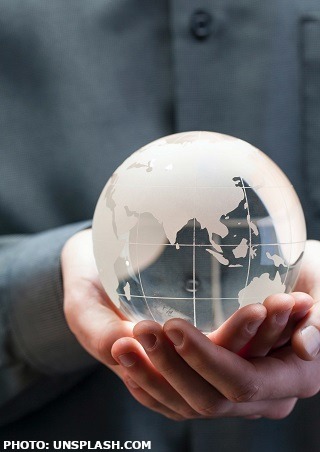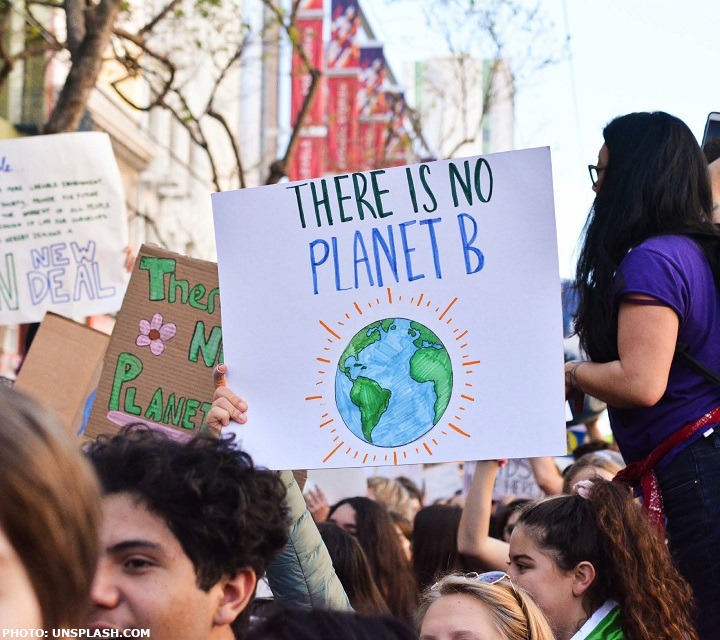WORDS: ZINA DOBERSBERGER
PHOTO: MIA MEDAKOVIĆ-TOPALOVIĆ
What comes to mind when you read these words?
Climate change. Zero waste. Circular economy. Sustainable cities.
For many, these words elicit strong reactions: fear, anger, frustration, shame, despair, and for some… rejection.
It seems almost every other article, Facebook post, or trending Twitter topic is trying to convince us of our impending doom—warning us that we are rapidly approaching a tipping point where the damage to our planet could be irreparable. Year after year we watch disturbing videos of bushfires devastating Australia, or starving polar bears in the Arctic. We scroll past vivid images of forest habitats in South America and Southeast Asia, left completely barren due to logging and other human activities.
Although these images and reports shock and sadden us, in my opinion, they depict realities that are often too far removed from the lives of most of the everyday citizens that view them. Somehow along the way, the connection between those tragedies thousands of miles away and our own communities get lost.
And even when tragedy hits closer to home (think about the devastating floods in France recently or even the outbreak of the Covid-19 pandemic and its consequences), so often the conversations about climate change and sustainability focus on the failure of governments to provide necessary infrastructure or pass legislation protecting the environment. We also shame and blame big corporations for their exploitative practices and obsession with maximizing profits—no matter the human or environmental cost.
Don’t get me wrong here, we definitely need to hold these actors accountable. But what is so often conveniently lost in the conversation about climate change and the future of our planet, is us: the everyday actions and decisions of individual citizens. Are we holding ourselves accountable? Are we being honest about our own habits and lifestyles and how they impact the world around us?
In case the answer is not immediately clear, the answer is a definite no.
I’m not here to shame anyone. I’m writing this article knowing full well that I regularly make mistakes, behave selfishly, and occasionally give in to laziness (hello food delivery!). To err is human, right? Well, we know from all those “doom and gloom” articles and social media posts I mentioned earlier where our collective and constant erring has landed us.
Fear not, there is hope! Fortunately for humankind, our species has both the capacity and the tools to not only save ourselves but billions of other living organisms on the planet.
There are plenty of people smarter than I am out there that have put together amazing lists, videos, or blogs with practical examples of how you can reduce your impact on the environment and live a more sustainable lifestyle, so I won’t do that. But what I do want to do, is back up a step and offer my advice on how to break down these issues. These global problems are big and scary (and if you disagree you, might want to check that you’re not a robot), but they don’t have to feel overwhelming.
 Keep it simple. Start small and work your way up.
Keep it simple. Start small and work your way up.
Think about what you do every day. How do you get from point A to point B? What do you eat? What tools, appliances, or materials do you use? What spaces do you occupy? What do you buy or consume the most of? Once you start to answer these questions, it becomes easier to identify where you can start to make changes. Does your day start with a 30 minute, boiling hot shower? Try cutting that in half. You grab a to-go coffee cup every morning on your way to work? Invest in a reusable coffee mug. The office orders way too much food at lunch, which includes plastic utensils, straws, and napkins that aren’t needed? Go out for lunch. Or if you do order delivery, order fewer portions and let the restaurant know you don’t need utensils. The most commonly-listed ways for people to reduce their waste and carbon emissions (avoid plastic, buy only what you need, eat less meat) are based on, you guessed it… common sense!
This isn’t rocket science, but just like with any lifestyle change (ex. getting more sleep, losing weight, eating healthier) getting started is the hardest part. Real, meaningful change requires serious commitment and consistency. It’s tough, but not impossible. Reflecting on your habits, challenging yourself to change them, and celebrating and sharing those successes with those around you can make it easier to move up to bigger challenges (ex. Buying less, flying less, meat-free month, etc.), and ultimately inspire others to start their journey.
Strength in unity
Where I come from, we have a saying, “It takes a village”. We typically use this phrase in the context of raising children, but I’ve found that it can easily apply to different situations—including reducing our impact on the environment.
The reality is, no one country, government, organization, or person can take on these global problems alone (no, not even Greta Thunberg). It may seem counterintuitive, but if there is one lesson that we are learning as the Covid-19 pandemic drags on, it is how vital human connection and interaction are for the health and wellbeing of our communities (think less physical health and more social health). So why not apply that same learning in our efforts to make our communities more sustainable and environmentally-friendly?
Here again, starting small and working your way up is the key. Who are the people you see every day? Talk to them. Ask them what they’re doing to reduce their impact on the environment. Exchange ideas and learn from each other. Are there others in your school, office, or neighborhood that have started initiatives (ex. recycling programs, plastic-free zones, clothes swap gatherings, home composting)? If not, could you and a few others start something? What local organizations and groups are already working on these issues, and how could you support and/or learn from them?
In my experience, connecting with other like-minded individuals makes starting your journey towards a more sustainable and fulfilling lifestyle much easier. A collaborative and positive environment, where community members both encourage and hold each other accountable makes the challenges of addressing climate change, pollution, etc… seem less daunting. It’s also important that solutions make sense for the communities they are intended for. There is no better way to ensure this than having those solutions and initiatives come from within the community itself.
If you don’t care, why should anyone else?
Too often, I hear the excuses, “Well I’m not a scientist or expert. I’m not in government. I’m just one person. What difference can I make?”. I want to encourage anyone reading to put those thoughts out of your mind.
I wouldn’t dare to suggest that going meat-free once a week or ordering drinks without plastic straws can solve climate change alone. To solve these truly global issues will take an enormous effort and commitment at all levels. But I would dare to remind each person that the decisions you make every day do matter—whether you believe it or not. The waste you produce, the resources you use, how you get around, and where and what you spend your money on impacts your community (and likely other communities as well). It’s not just about saving cute baby polar bears in the Arctic. Reducing our impact on the environment is about human rights.
Ask yourself, do I have a right to breathe clean air and drink clean water? Do I have a right to a dignified existence? If the answer is yes, the way forward is simple. We are, each of us, capable of realizing our place in the great circle of life on this planet and making a conscious effort each day to act responsibly. It just makes sense.



